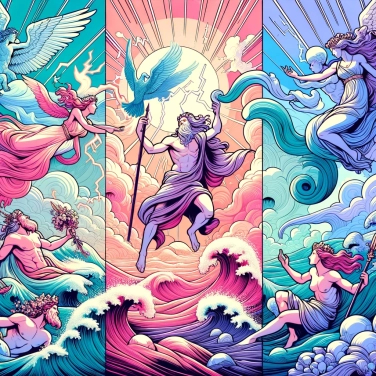The gods of Olympus were linked to natural elements as they were often associated with natural phenomena such as lightning (like Zeus), the sea (like Poseidon) or crops (like Demeter).

In Greek mythology, the gods of Olympus each had a special connection with nature and its elements. Zeus, for example, was the patron of the sky, so it's no surprise that he throws lightning bolts when he's angry. His brother Poseidon rules over the seas, easily capable of unleashing storms or tsunamis when provoked too much. Hera is often associated with the starry sky and marriage, quite a nice combo. On Demeter's side, she is the goddess of agriculture and harvests; if the harvest goes awry, it's surely her anger that's being expressed. Artemis protects wildlife and the forest, while her brother Apollo shines like the sun with his light and prophecies. In short, each god or goddess expresses in their own way the simple truths and cycles that the Greeks clearly observed in their daily environment.
In ancient Greece, natural elements were perceived as living powers in their own right. For example, Gaia literally represented the Earth, a mother goddess at the origin of all life. The sky, on the other hand, was Ouranos, her companion, symbol of the starry firmament. For the seas and oceans, there was Poseidon, the salty-bearded god who controlled the waves and storms. As for the wind, it was Aeolus who was in charge; depending on his mood, he would trap or release gusts in his famous bag. The sun and moon were even personified as twin gods: Helios, who drove his blazing chariot across the sky, and his sister Selene, a goddess with silver hair who illuminated the night. All this allowed the Greeks to simply explain a complex, unpredictable, and remarkably mysterious environment.
In Greek mythology, the gods simply explained why nature functions the way it does. The myth of Zeus hurling his lightning from Olympus made sense of violent storms, while the anger of Poseidon was the perfect explanation for earthquakes and destructive tidal waves. When the seasons changed abruptly or the land became barren, it was because of Demeter weeping for the absence of her daughter, Persephone, held captive in the Underworld. The Greeks were obviously not well acquainted with weather or seismic phenomena, so telling stories where gods experienced very human emotions made the whims of nature understandable and more reassuring. These tales provided a simple logic to unexplained phenomena and made nature alive and animated by beings similar to humans.
The ancient Greeks saw everything around them as inhabited by a divine presence. For them, nature was not a passive backdrop, but was directly animated by their gods. A river overflowing? It was the anger of a river deity. A violent storm? Zeus was expressing his power. Natural phenomena, such as lightning, storms, or earthquakes, were often interpreted as clear messages of the gods' moods. In short, nature was their preferred means of guessing what the gods had in mind, which created a relationship of respect but also of caution toward their everyday environment.
The ancient Greeks believed that the wrath of Poseidon, the god of the sea, caused earthquakes. Thus, when an earthquake occurred, it was generally seen as a manifestation of his displeasure!
The olive tree was sacred to Athena because mythology tells that she offered it to the inhabitants of Athens, symbolizing wisdom, prosperity, and harmony with nature.
Every year, during the Thesmophoria festival, Greek women would honor Demeter, the goddess of agriculture, by burying offerings in the ground, thus initiating a ritual to hope for an abundance of crops.
Zeus was often symbolized by lightning, as the Greeks viewed lightning strikes as direct manifestations of divine power, thus helping to explain otherwise inexplicable weather phenomena at the time.
Demeter, the goddess of agriculture and harvest, explained the seasonal cycle in Greek mythology through her daughter Persephone. When Hades abducted Persephone to the underworld, Demeter, in her grief, ceased to fertilize the earth, causing winter's sterility; Persephone's annual return to the earth coincided with the spring rebirth.
Sure! Here's the translation: "Yes, for the ancient Greeks, the gods were not just mythological figures, but represented a living reality that was both honored and feared. The gods, being associated with natural elements, allowed them to explain the unknown and manage their anxiety in the face of nature's elusive power. Religious rites and practices thus served as a way to appease these forces perceived as divine."
Poseidon, the Greek god, is closely associated with the oceans, seas, and earthquakes. His direct connection to the oceans likely stems from the fact that the seas played a central role in the lives of the ancient Greeks, who relied heavily on navigation and fishing. Due to his unstable and powerful nature, the unpredictable character of the seas was perfectly symbolized by Poseidon, who is often depicted as wrathful and changeable.
The Greeks worked and lived in close contact with nature, which largely determined their survival. In order to understand and explain the natural mysteries they could not control, they imagined that specific deities influenced each phenomenon. Thus, storms, lightning, earthquakes, and even abundant harvests were seen as manifestations of the gods.
Although Athena is renowned as the goddess of wisdom and warfare strategy, she was also associated with the olive tree, a natural symbol of peace and economic prosperity for Athens. The mythical creation of the olive tree by Athena marked her direct connection to a protective natural element for the Greek city and represented her divine benevolence towards humanity.
Zeus is considered the god of the sky and thunder because for the ancient Greeks, lightning was seen as a manifestation of power, supreme authority, and divine wrath. As the king of the gods, Zeus controlled this natural element to demonstrate his superiority and punish mortals or immortals who opposed him.

No one has answered this quiz yet, be the first!' :-)
Question 1/6